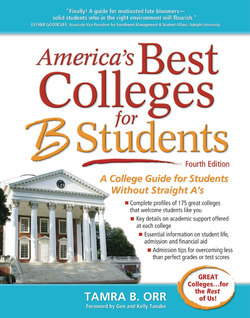Читать книгу America's Best Colleges for B Students - Tamra B. Orr - Страница 55
На сайте Литреса книга снята с продажи.
YOUR INTERVIEW HOMEWORK
ОглавлениеRemember those college brochures filled with pictures, statistics and text cultivating dust balls under your bed? Dig them out before your interview and do something really radical—read them! It is not necessary to read them cover to cover, but knowing such basic facts as where the school is located, what kind of environment it has, some of the courses it offers and some of the activities you may choose to participate in is a good idea. It does not impress interviewers to discover that students who are applying to their beloved alma mater do not even know what state it is located in or that the college is single sex. (There was an applicant who actually made it to the interview before he learned that the college he was applying to was an all-women school!)
Try to talk to relatives or friends who attend or have attended the college. They can give you insights into the college that are not found in the glossy brochures. The more you know the better.
Doing your homework will allow you to be able to ask intelligent questions. You are making the most important decision of your life so far. It makes sense that you would have a question or two about it. Having prepared questions not only helps create the two-way conversation dynamic, but it also demonstrates that you are serious about attending the college.
Not all questions are good questions, and in particular, avoid asking those obvious ones where the answers are on the first page of the college’s brochure. Instead, the best questions to ask your interviewers are those that make them reflect on their own experiences, require them to do a little thinking and elicit an opinion. Making your interviewers think or express their opinions makes the interviews more interesting for them and makes your question seem insightful and probing. Some examples:
What do you think about the X department?
How did the small/large class size affect your education?
How did X college prepare you for your career?
What was the best opportunity you felt X university provided you?
What is the best/worst aspect of X university or X city?
If you had to do it again, what would you do differently?
Think of some more questions like these and write them on a list with the most interesting ones at the top. Take this list into the interviews and refer to them when the conversation begins to stall and when your interviewers ask you if you have any questions.
Reprinted with permission from Get into Any College by Gen and Kelly Tanabe
Your college interview is also a chance for you to ask questions. By doing so, you often show initiative and curiosity—two traits most colleges are looking for in their students. Ask if the officer has any advice for you, ask a question about your potential major or ask about dorm activities and college lifestyle. Find out if there will be a new student orientation program, what activities are available for freshmen, what part-time job opportunities there are in the area or end with a zinger like, “Is there anything you would like to know about me in order to help you make a fair and final decision about my application?”
The interview is a unique opportunity to establish rapport with a person who previously only knew you as numbers and words on paper. Use it wisely and show the interviewer(s) what a fantastic person you really are!
